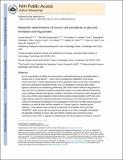Metabolic determinants of cancer cell sensitivity to glucose limitation and biguanides
Author(s)
Possemato, Richard; Lorbeer, Franziska K.; Bayraktar, Erol C.; Thiru, Prathapan; Yucel, Burcu; Wang, Tim; Chen, Walter W.; Clish, Clary; Wang, Tim; Birsoy, Kivanc; Sabatini, David; ... Show more Show less
DownloadSabatini_Metabolic determinants.pdf (4.429Mb)
PUBLISHER_POLICY
Publisher Policy
Article is made available in accordance with the publisher's policy and may be subject to US copyright law. Please refer to the publisher's site for terms of use.
Terms of use
Metadata
Show full item recordAbstract
As the concentrations of highly consumed nutrients, particularly glucose, are generally lower in tumours than in normal tissues, cancer cells must adapt their metabolism to the tumour microenvironment. A better understanding of these adaptations might reveal cancer cell liabilities that can be exploited for therapeutic benefit. Here we developed a continuous-flow culture apparatus (Nutrostat) for maintaining proliferating cells in low-nutrient media for long periods of time, and used it to undertake competitive proliferation assays on a pooled collection of barcoded cancer cell lines cultured in low-glucose conditions. Sensitivity to low glucose varies amongst cell lines, and an RNA interference (RNAi) screen pinpointed mitochondrial oxidative phosphorylation (OXPHOS) as the major pathway required for optimal proliferation in low glucose. We found that cell lines most sensitive to low glucose are defective in the OXPHOS upregulation that is normally caused by glucose limitation as a result of either mitochondrial DNA (mtDNA) mutations in complex I genes or impaired glucose utilization. These defects predict sensitivity to biguanides, antidiabetic drugs that inhibit OXPHOS, when cancer cells are grown in low glucose or as tumour xenografts. Notably, the biguanide sensitivity of cancer cells with mtDNA mutations was reversed by ectopic expression of yeast NDI1, a ubiquinone oxidoreductase that allows bypass of complex I function. Thus, we conclude that mtDNA mutations and impaired glucose utilization are potential biomarkers for identifying tumours with increased sensitivity to OXPHOS inhibitors.
Date issued
2014-03Department
Massachusetts Institute of Technology. Department of Biology; Whitehead Institute for Biomedical Research; Koch Institute for Integrative Cancer Research at MITJournal
Nature
Publisher
Nature Publishing Group
Citation
Birsoy, Kıvanc, Richard Possemato, Franziska K. Lorbeer, Erol C. Bayraktar, Prathapan Thiru, Burcu Yucel, Tim Wang, Walter W. Chen, Clary B. Clish, and David M. Sabatini. “Metabolic Determinants of Cancer Cell Sensitivity to Glucose Limitation and Biguanides.” Nature 508, no. 7494 (March 16, 2014): 108–112.
Version: Author's final manuscript
ISSN
0028-0836
1476-4687